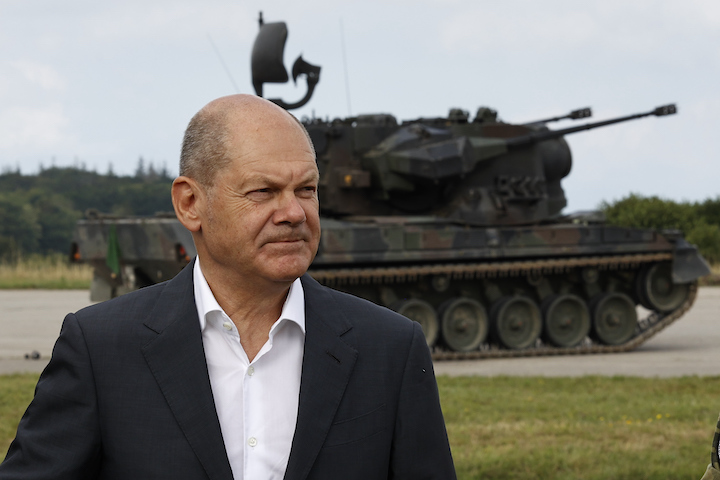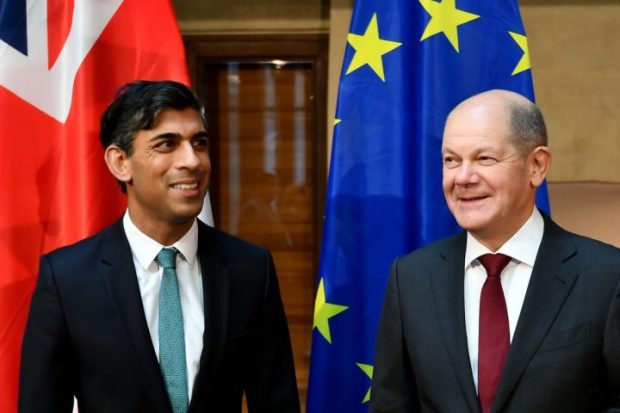Difficult though it may be to believe, there is chaos at the top of the German government over its mishandling of the war in Ukraine. Germany’s defence minister, Christine Lambrecht of the Social Democratic party, has quit her post after the most extraordinary series of unforced errors.
The war has brought all of this to a head. It has exposed Europe’s lax security and complacency. But German defence has been in a league of its own for many years. Over the course of the war, there has been no end to the amount of troubling information that has emerged.
German authorities so underrated the chance of war, the country’s intelligence chief was trapped in Ukraine when the war started and had to be evacuated by special forces, while the head of Germany’s cybersecurity had such close ties to Russia that he had to be fired. At least one Russian spy was well-placed in the German defence establishment (a spy whom German authorities did not find – and had to be told about by an ally).
The entire governing class from the Angela Merkel era remains absolutely unrepentant about their decades-long appeasement of Vladimir Putin’s Russia (including a revisionist reading of Neville Chamberlain from Merkel herself). And Germany’s defence industrial base has been found to be completely on the floor: it’s unprepared to defend the nation, let alone Europe.
Germany announced a 100 billion euro increase in defence spending at the beginning of last year. Yet increasingly, media analysts can’t seem to find this money in anything practical that has been done since then. The German armed forces remain bureaucratic, small and underequipped; procurement is still a nightmare.
And that’s just on the security side of things. The politics is even worse. German Chancellor Olaf Scholz has been pushed into every good decision he has (eventually) made.
German Chancellor Olaf Scholz has been pushed into every good decision he has (eventually) made
First, he said, there were no tanks to give Ukraine. Not true. Then he cried that the major German arms manufacturers were unable to produce them (something Rheinmetall, the national armaments firm, emphatically denied). After this, Germany tried to sell its armoured vehicle stock to anyone but Ukraine, including Greece, with the vague sense that if Greece got up-to-date infantry fighting vehicles it could offload its Cold War-era junk on Ukraine.
Then Scholz and Lambrecht said it was for other countries which operated German equipment to donate tanks to Ukraine – only for at least half a dozen countries which operate German Leopards to say that it was a German veto that had been holding them back. Now, at long last, Germany appears to have conceded. It said it would send some armoured vehicles to Ukraine – although by no means soon.
And it has hinted, now Britain has pushed ahead and formally announced the provision of a squadron of Challenger 2 main battle tanks, that it might be wheedled, induced and bribed into doing the same thing. But only if everyone else jumps first. Even then, the German defence establishment said, what with training and crewing and the rest, it won’t be until Spring at the earliest that German tanks could arrive at the front. What a pity.
Even the French (whose President, Emmanuel Macron, aped Scholz earlier in the war by ringing up Vladimir Putin weekly like a lovesick teenager) have broken free of the former Franco-German axis of appeasement and are now champing at the bit and rolling their metaphorical eyes at German slowness and parsimony.
We are so used to hearing about the superiority of everything German: from finance to industrial design to politics. Yet when it comes to serious things, like the future of a free Europe, it seems Germany has produced two successive chancellors who care little about anything beyond the end of their nose – while being prepared to lecture others with an infuriating piety at the same time. Many Germans with knowledge of their pitiful national defence – or with some political awareness of the constant backpaddling and double-dealing of the Chancellor – wish it were otherwise.
Quite charmingly, the German Green party is the most hard-headed and decisive of them all. Most of the chancelleries of Europe would rather the Green leader and foreign minister, Annalena Baerbock, were chancellor. So would the Ukrainians.
Germany is a rich nation. It could have powerful and large armed forces if it so chose. It has knowhow and immense industrial capacity, plus a generation or two of people who would be willing to fight for the defence of Europe.
Behind the Chancellor and his appeasing political party stand members of his own coalition who would be willing to do what is right. Let us hope they succeed in making it clear to Scholz that it is not just his legacy in danger if he doesn’t change course: it is his political life.
Got something to add? Join the discussion and comment below.
Get 10 issues for just $10
Subscribe to The Spectator Australia today for the next 10 magazine issues, plus full online access, for just $10.



















Comments
Don't miss out
Join the conversation with other Spectator Australia readers. Subscribe to leave a comment.
SUBSCRIBEAlready a subscriber? Log in